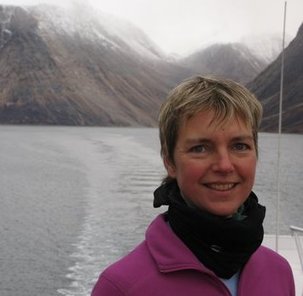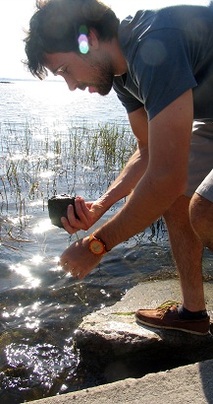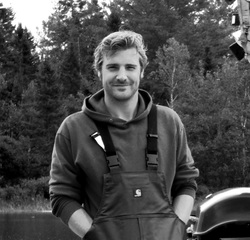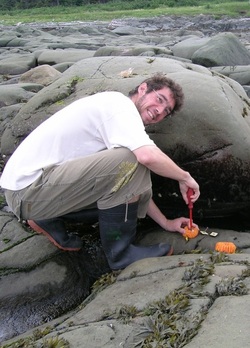Anne Fontaine, PhD candidate (2012-)

Thesis title: Ecological mapping for marine management: concepts, methodologies and limits. Case studies in the Gulf of St Lawrence and Labrador and Newfoundland Shelves.
After several years of work for the French ministry of ecology in freshwater and marine management, I am aware of the importance to improve the relationships between the scientific community and the decision-makers. The implementation of marine ecosystem management and the need to protect marine biodiversity call for the adoption of a common ecological framework. In this context, my project aims to identify the different approaches used to define marine ecological units at different scales and to evaluate their robustness. A literature review will highlight the differences between different ecological mapping studies in terms of concepts and methodologies. Then, through two case studies, I will examine the sensitivity of ecological mapping to different parameters. With the data collected in the Labrador and Newfoundland Shelves, I will evaluate how the boundaries of ecological units may change over time. In the case study of the Gulf of St Lawrence, I will compare the ecological units obtained with different biological datasets (demersal fishes, epibenthic fauna) and at different taxonomic levels to determine to what extent the delineation of ecological units is directly linked- or not- to the taxa studied.
Academic background: Engineer Water and Forests (Ecole Nationale du Génie Rural, des Eaux et des Forêts), Paris, France
Key-words: ecological mapping, marine biodiversity, bioregions, biogeography, Gulf of St Lawrence, Newfoundland and Labrador Shelves, demersal fishes, benthic epifauna
Co-director: Rodolphe Devillers (Memorial University of Newfoundland)
Contact: [email protected]
After several years of work for the French ministry of ecology in freshwater and marine management, I am aware of the importance to improve the relationships between the scientific community and the decision-makers. The implementation of marine ecosystem management and the need to protect marine biodiversity call for the adoption of a common ecological framework. In this context, my project aims to identify the different approaches used to define marine ecological units at different scales and to evaluate their robustness. A literature review will highlight the differences between different ecological mapping studies in terms of concepts and methodologies. Then, through two case studies, I will examine the sensitivity of ecological mapping to different parameters. With the data collected in the Labrador and Newfoundland Shelves, I will evaluate how the boundaries of ecological units may change over time. In the case study of the Gulf of St Lawrence, I will compare the ecological units obtained with different biological datasets (demersal fishes, epibenthic fauna) and at different taxonomic levels to determine to what extent the delineation of ecological units is directly linked- or not- to the taxa studied.
Academic background: Engineer Water and Forests (Ecole Nationale du Génie Rural, des Eaux et des Forêts), Paris, France
Key-words: ecological mapping, marine biodiversity, bioregions, biogeography, Gulf of St Lawrence, Newfoundland and Labrador Shelves, demersal fishes, benthic epifauna
Co-director: Rodolphe Devillers (Memorial University of Newfoundland)
Contact: [email protected]
Jordan Ouellette-Plante, M.Sc. candidate at McGill* (2011-)

My masters research focuses on two invasive bivalves: the zebra mussel (Dreissena polymorpha) and the quagga mussel (D. bugensis). In comparison with the Great Lakes, which was invaded by these two species in the 1980s, their ecology in large rivers received relatively little attention - particularly how inorganic suspended sediment loads affects their growth and filtration. The St. Lawrence River (SLR) is one of the few rivers in North America that contains both dreissenid species. Such a large system provides opportunities to study spatial and temporal variations along the river bed, which in turn will provide information on the shifting mosaic of abiotic and biotic conditions that form local habitats. This environmental heterogeneity provides a platform for comparing dreissenid tolerance to suspended sediments regimes. Comparing the filtration apparatus (gills and labial palps) of these mussels may provide valuable insight into why quaggas are becoming dominant in areas previously dominated by zebra mussels. My research thus aims to compare the growth rates of these two invasive bivalves in different turbidity environments within the SLR, and to relate these differences to temporal and spatial variation in their soft tissue morphology.
Academic background:
Director: Dr. Anthony Ricciardi, McGill University
Contact: [email protected]
Academic background:
- B.Sc. (Ecology), Université de Sherbrooke, 2009
Director: Dr. Anthony Ricciardi, McGill University
Contact: [email protected]
Samuel Collin, PhD candidate (2009-2013)

Samuel’s doctoral work focuses on the recent invasion of the tunicate Ciona intestinalis in Prince Edward Island, Canada. His work covers different aspects of the invasion process; patterns of recruitment during the early stages of invasion, larval behaviour during settlement (geotactic and phototactic responses), and finally interactions with local native and invasive species of caprellid amphipods (Caprella linearis and C. mutica, respectively). The results from these studies aim to reveal why Ciona has become such a successful and problematic invader in Prince Edward Island and identify improvements for current monitoring and detection strategies, both in terms of equipment design and spatial allocation of effort.
Academic background:
Contact: [email protected]
Academic background:
- B.Sc. (Hons) Marine Geaography, Cardiff University, Wales, UK
- M.Res. Marine Biology, University of Plymouth, England, UK
Contact: [email protected]
Nicolas Le Corre, PhD candidate* (2007-2013)

Nicolas did his Bachelor at Brest University (France) in the organismal biology program and his Master at Bordeaux 1 University (France). His master project was about the impacts of the tropical benthic macro fauna (shrimps, crabs and worms) on the microphytobenthos in the intertidal zone of Southport (Queensland, Australia). His doctoral work at Université Laval, codirected by Dr. Frédéric Guichard (McGill), deals with recruitment and connectivity within marine metapopulations, his model being the blue mussel (Mytilus spp.) in the St. Lawrence maritime estuary. He studies spatiotemporal variability of recruitment at different scales, and especially temporal variations of the type of recruitment (primary vs. secondary). He also works on assessing connectivity distances and their variability among local populations.
Academic background:
- MSc. Bordeaux 1 University (France)
- B.Sc. Brest University (France)
Codirector: Dr. Frédéric Guichard, McGill
Contact: [email protected]
Website: http://nicolaslecorre.besaba.com/
Current people associated with the Benthic Lab
Lab coordinator
Dr. Anissa Merzouk (2009) - [email protected]
Ph.D. Students
Annick Drouin* (2006) : Biological invasions - seaweeds ([email protected])
Nicolas Le Corre (2007) : Marine metapopulations - mussels ([email protected])
Paul Edwards* (2007, McGill) : Biological invasions - modeling ([email protected])
Sam Collin (2008) : Marine invasions - tunicates ([email protected])
Katie MacGregor (2011) : Invertebrate behaviour - urchins ([email protected])
Carla Narvaez (2011): Invertebrate demography - urchins ([email protected])
Thew Suskiewicz (2012) : Marine ecology - kelp ([email protected])
Anne Fontaine (2012) : Marine ecosystems - mapping ([email protected])
Masters Students
Anis Marzouk (2007): Invertebrate ecology - gastropod feeding ([email protected]) Helmi Hamdi (2008): Invertebrate ecology - mussel recruitment ([email protected])
Jordan Ouellette-Plante* (2011,McGill) : Invasion biology - freshwater bivalves
([email protected])
Étudiants visiteurs
Samir Khemiri (2011) : Invertebrate ecology and behaviour - amphipods ([email protected])
Meike Kern (2012) : Invertebrate ecology - freshwater mussels ([email protected])
Lab coordinator
Dr. Anissa Merzouk (2009) - [email protected]
Ph.D. Students
Annick Drouin* (2006) : Biological invasions - seaweeds ([email protected])
Nicolas Le Corre (2007) : Marine metapopulations - mussels ([email protected])
Paul Edwards* (2007, McGill) : Biological invasions - modeling ([email protected])
Sam Collin (2008) : Marine invasions - tunicates ([email protected])
Katie MacGregor (2011) : Invertebrate behaviour - urchins ([email protected])
Carla Narvaez (2011): Invertebrate demography - urchins ([email protected])
Thew Suskiewicz (2012) : Marine ecology - kelp ([email protected])
Anne Fontaine (2012) : Marine ecosystems - mapping ([email protected])
Masters Students
Anis Marzouk (2007): Invertebrate ecology - gastropod feeding ([email protected]) Helmi Hamdi (2008): Invertebrate ecology - mussel recruitment ([email protected])
Jordan Ouellette-Plante* (2011,McGill) : Invasion biology - freshwater bivalves
([email protected])
Étudiants visiteurs
Samir Khemiri (2011) : Invertebrate ecology and behaviour - amphipods ([email protected])
Meike Kern (2012) : Invertebrate ecology - freshwater mussels ([email protected])
